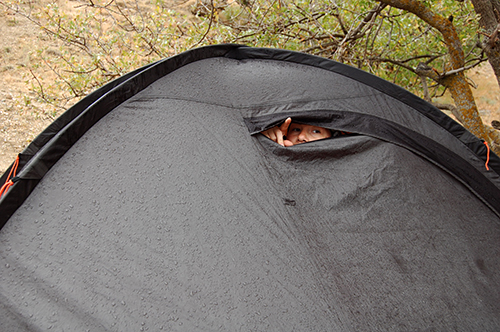10 Tips for Rainy Day Camping
Aug 09, 2022

Although weather conditions have been brutally hot and dry over the past few months, recent rain showers in different parts of the state have begun to cool temperatures down and replenish the land. While it is hard not to be thankful for the much-needed rain, wet weather can hinder outdoor activities such as camping.
With a little extra preparation, camping in the rain doesn’t have to be a challenge. Follow the 10 tips listed below to keep dry and ensure a fun camping experience no matter the weather forecast.
Co-op has much of the gear and supplies you need for your next camping trip or outdoor excursion at prices that rival competitors, so before you make the long haul to a big-box retailer, consider shopping local!
For more content like this, check out the latest issue of The Cooperator.
With a little extra preparation, camping in the rain doesn’t have to be a challenge. Follow the 10 tips listed below to keep dry and ensure a fun camping experience no matter the weather forecast.
- Pitch your tent on high ground and avoid camping too close to waterways such as rivers and lakes, which can quickly rise in a flash flood. Look for the lowest area around your campsite and be mindful of how rainwater will flow there — you don’t want to pitch your tent beside a drainage ditch.
- Avoid setting up camp directly under a tree. Falling branches and other debris can be dangerous in a storm, and raindrops will continue to drip on your head long after the rain has stopped.
- Place an extra tarp above and below your tent to keep water from seeping inside. Make sure the ground tarp is no longer than the bottom of your tent; water can pool in the folds of the tarp and work its way inside.
- Add an extra layer of protection to your tent by using waterproofing spray and seam sealer. Make sure to do this before it starts raining, though; it will not work on a tent that is already wet.
- Gather firewood as soon as you arrive at the campsite before it starts to rain. Wrap the wood in a tarp or garbage bag to keep it dry. Although you may not use it while it’s raining, building a fire after a storm will warm you up and help to dry out any clothes that got wet.
- Bring food that doesn’t have to be cooked. There’s nothing worse than getting hungry in a downpour and not having the ability to build a campfire to cook a meal. Consider purchasing a camping stove that can be used under a tarp or canopy if the forecast looks especially dreary.
- Pack a clothesline and string it under a tarp so that you can hang all your wet clothing to dry. If you throw them in a pile, they will quickly mildew, making them unwearable for the rest of the trip.
- Bring additional lighting, such as flashlights, lanterns, and batteries. Overcast skies can make it dark, especially inside your tent.
- Put your old newspapers to good use. Dry paper can be used to start a fire if you’re unable to find dry kindling, or place it in your wet shoes to soak up the moisture and speed up the drying process.
- Lastly, pack games, books, and other activities to keep you entertained in a tent or under a canopy. Take advantage of the time to relax and spend time with family and friends.
Co-op has much of the gear and supplies you need for your next camping trip or outdoor excursion at prices that rival competitors, so before you make the long haul to a big-box retailer, consider shopping local!
For more content like this, check out the latest issue of The Cooperator.